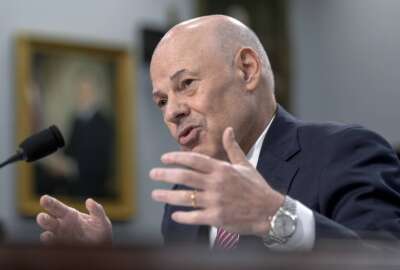The Supreme Court Chevron decision spreads wider and wider
The so-called Chevron decision has implications for all three branches of government.
Pretty much every lawyer, lobbyist, rule-maker, think-tanker and wonk in Washington and beyond has been thinking about the same thing. The Supreme Court decision that ended the idea that courts should always defer to federal agencies for interpreting vague laws. As we’ve reported, the so-called Chevron decision has implications for all three branches of government. Joining the Federal Drive with Tom Temin with how Congress might deal with it, a senior policy analyst at the Bipartisan Policy Center, J. D. Rackey.
Interview transcript:
Tom Temin Mr. Rackey, good to have you with us.
J.D. Rackey Good to be here. Thanks for having me.
Tom Temin And you worked on the Hill, so you probably saw some of that sausage being made. What’s your overall take on the meaning of this for Congress?
J.D. Rackey At a high level, I think the biggest takeaway is that Congress is going to have to be much more active than it has become accustomed to over the past 40 years. And it’s going to need to give itself a lot more resources than it has to be able to accomplish this new style of lawmaking, that the court is kind of insisting that it adopt.
Tom Temin Right, so the immediate implication for those looking in from the outside is that they would have to maybe make more laws, one for each specific thing it wanted to do. And rather than, say, make the air cleaner, regulate this gas or that particulate, which they have not done. Am I making it too simple, or Is that about right?
J.D. Rackey So, there’s a couple of different ways that they could approach it. They could approach it that way, and being very particular in how they draft legislation, almost to the point of drafting the regulation themselves. Or it could mean something a little bit more looser, where, say, for example, they want to direct the agencies to protect personal information from AI entities. And, so, before, they could just say, agencies protect personal information from AI, and agencies could figure out how to do that. Whereas now, they might have to define what is AI? What is personal information? What contexts do we want to protect personal information from AI? And even that level of specificity, Congress doesn’t necessarily have the expertise in AI policy, or, and, this is transferable to any policy area, to accomplish that kind of lawmaking, as it stands.
Tom Temin Right, and, so, yes, you’re arguing for more resources, in other words, to inform Congress of how it has to do its job based on knowledge of specific technologies or areas of the economy.
J.D. Rackey Pick your policy area, I think this will apply. And, so, while some people have cheered for this ruling, that it’s going to lessen the the amount of regulation that government is creating, I think this really is going to have an impact on all future lawmaking, and how all legislation is drafted. So, even the things that where there’s bipartisan agreement on, or where small government proponents still want to legislate, they’re still going to be affected by this.
Tom Temin And, by the way, I noticed from your biography that one of the places you worked in Congress was on the select committee for the modernization of Congress. We had members of that committee on repeatedly over the past few years. Was this something envisioned as part of modernizing Congress?
J.D. Rackey In a way. So, we certainly didn’t know that this court case was going to be taken up. But I think the select committee, a lot of our work was driven at reclaiming Article One authorities within Congress and building congressional capacity so that Congress could be more active and kind of direct government in the way that the Constitution envisioned. And, so, while we did a lot of work, and over three quarters of the committee’s recommendations have been implemented or are on their way to implementation, I don’t think those recommendations go far enough to help Congress reckon with the new landscape. But it’s certainly all of that work the past five years has started to, I think, shift Congress’s mentality in how it views itself and its role in the system.
Tom Temin We’re speaking with J.D. Rackey. He’s a senior policy analyst at the Bipartisan Policy Center. And, by my last count, the staff of Congress, so to speak, was about 30,000 people. And they are overseeing a bureaucracy that has about two million people. So, there’s a little bit of inequality there with respect to deep subject matter expertise. But where do you envision this added resource for Congress occurring, in the committee staffs, in the personal staffs, or in the agencies such as GAO, which is trying to build its science and technology expertise for some years now, in places like that?
J.D. Rackey I kind of envision across the board they will increase the resources. I think the kind of most pressing area will be in committees, particularly increasing nonpartisan committee staff who are policy experts. You know, we’ve seen committee size committee staff sizes shrink by about a third over the past 30 years. So, that’s one immediate area that could be increased. I think the other biggest pressing area would be the support agencies, the Congressional Research Service, in particular, needs a lot more resources. And then there’s been proposals by others to create a new office of regulation so that maybe Congress can take a stronger hand in crafting regulations, and the science and technology implications of the decision are probably the most important and in the area where Congress is least prepared to act. And so either bringing back the old Office of Technology Assessment or giving more resources to this STAA within GAO should be considered. And I’ll say Congress has been kind of going back and forth on on that decision the past couple of years. There’s been a study by GAO at the direction of the Select Committee about which way Congress should go, and the Committee on House Administration has been studying that report. I think it just came back a month or two ago.
Tom Temin OTA’s been gone 25 years, but not forgotten, you might say?
J.D. Rackey Correct. It is still on the books, it just has no money. So it could it could be brought back and reformed relatively easily as as far as standing up agencies go. But I think the court decision is going to bring all of this discussion to a finer point and increase the urgency with which Congress has to deal with it.
Tom Temin Yes, and, you know, the world seems to be getting more complicated. But in some sense, Congress had similar decisions on regulation, as far back as when, you know, canals were being cut through counties and so forth. You know, inland improvement, I think they call it back a couple centuries ago. But do you think that this would, the decision, the Chevron decision, would make Congress pause on whether something needs a law in the first place?
J.D. Rackey I think the biggest implication of it is going to be when Congress decides a law does need to be made, does negotiations into what that law looks like, and will take much longer, need to be in much more detail. And, in some cases, you know, compromise could be inhibited cecause they can’t punt on the finer decision points to the agencies anymore.
Tom Temin Right. And there’s also the opportunity for lots of weird specifics to come into a law, say, we want to regulate XYZ. But then the industry comes in and says, fine with XYZ, but not XYZ sub-part A, L and M. And odd things come into a law. Why is that exempt? Well, because somebody thought that should be and got in their ear.
J.D. Rackey So, I’m a little less concerned about that. I kind of view that that’s always happened to some degree throughout the policy process throughout our history. So, I know there’s been a lot of focus on that this will make lobbying even more nefarious of Congress. And I think the impacts will be, on that aspect of it, will pretty much be the same it’s always been. There’s always been pressure groups and different people interested in different aspects of the law and have tried to get the ear of policymakers. And, from that perspective, I don’t see a change.
Tom Temin And finally, what about the congressional oversight function? Do you see that changing as a result of this decision?
J.D. Rackey Congress is going to need to do a lot more oversight, not just kind of hand-slapping oversight, but oversight to learn about policies. And, so, this, I think this is where the select committee is important. We piloted a couple of different ways of running hearings that are more focused on members learning information and less about grandstanding and less about fighting with each other for scoring partisan points, by, you know, getting rid of five minute statements and sitting in a roundtable format and kind of just having a normal discussion like we are here, that members can maybe learn more about information. And, so, I think Congress is going to need to do adopt some of those methodologies into its oversight function so that it can be better informed for lawmakers.
Tom Temin Imagine a round table of normal discussion. We can dream, can’t we?
J.D. Rackey It happens a little bit, but not not as much as it should.
Tom Temin J.D. Rackey is a senior policy analyst at the Bipartisan Policy Center. Thanks so much for joining me.
J.D. Rackey Thanks for having me.
Tom Temin We’ll post this interview along with a link to his essay at federalnewsnetwork.com/federaldrive. Subscribe to the Federal Drive wherever you get your podcasts.
Copyright © 2024 Federal News Network. All rights reserved. This website is not intended for users located within the European Economic Area.
Tom Temin is host of the Federal Drive and has been providing insight on federal technology and management issues for more than 30 years.
Follow @tteminWFED






